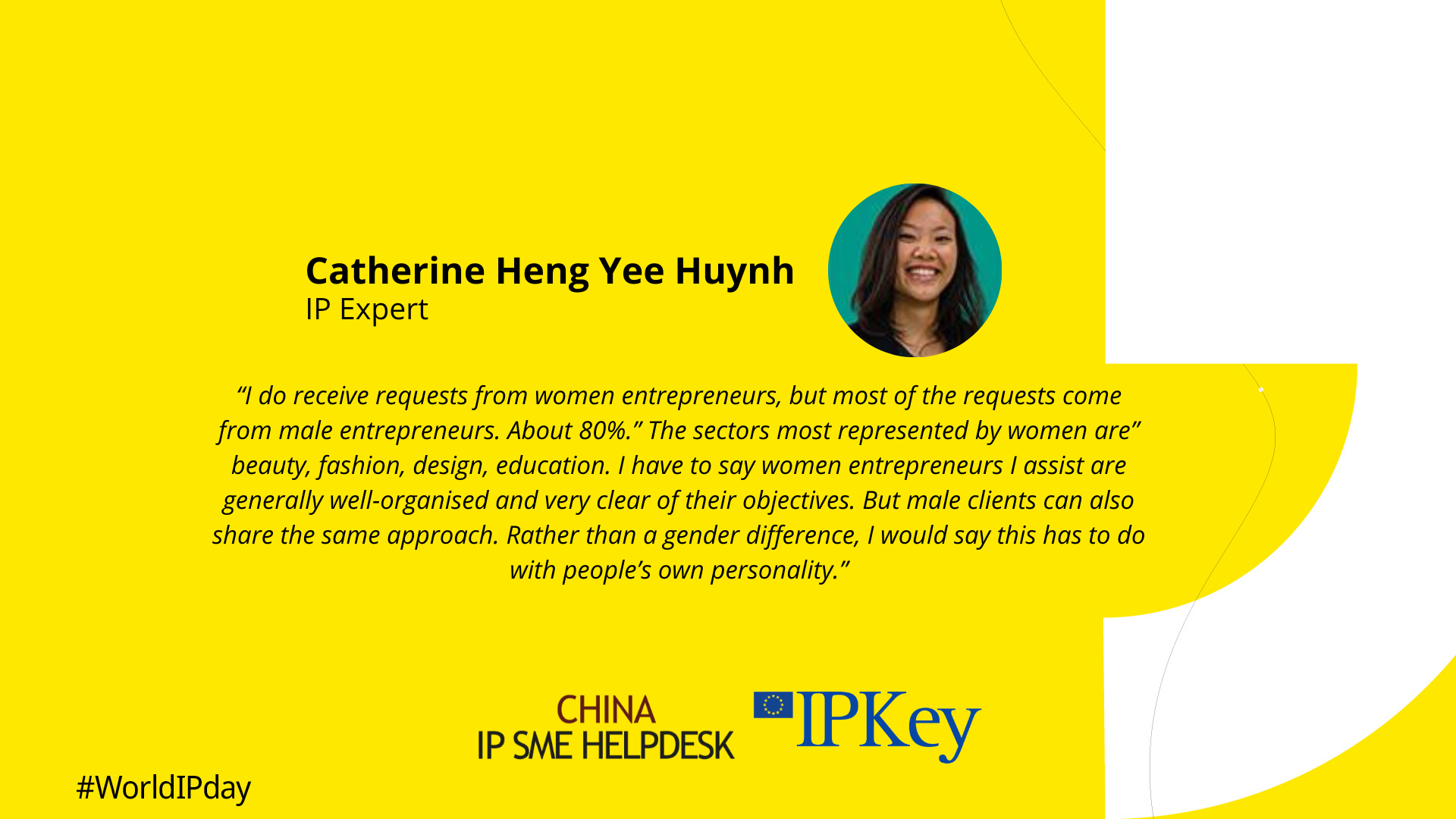INTERVIEW WITH CATHERINE HENG YEE HUYNH
For generations, women have shaped our world with their ingenuity and creativity. Women everywhere are driving scientific breakthroughs, setting new creative trends, building businesses, and transforming our world.
In 2023, we celebrate the “can do” attitude of women inventors, creators and entrepreneurs around the world and their ground-breaking work.
Women in all regions are shaping the world through their imagination, ingenuity, and hard work, but often face significant challenges in accessing the knowledge, skills, resources and support they need to thrive.
The 2023 World Intellectual Property campaign is an opportunity to celebrate all talented women around the world and promote the development of more inclusive and diverse IP ecosystems that accelerate innovation, creativity, and business growth for the benefit of all.
On that occasion, we interviewed Catherine Heng Yee Huynh, intellectual property expert:
1. Who is Catherine? What do you do? Why China?
I am a bi-cultural (French born Hongkongese) and enthusiastic Intellectual Property Law and Data Privacy lawyer based in Paris, France. I am the founding partner of the law firm CATHERINE HENG YEE HUYNH and I mainly deal with copyright, trademarks, designs, data privacy and commercial matters. I have an expertise in the protection of creations, especially in France, European Union, mainland China, Hong Kong and Asia. When I started my career, I decided to join a multinational French company based in Shanghai, mainland China, as an in-house lawyer to fight counterfeiting. Having the opportunity to work in one of the fastest said ‘developing country’ and ‘biggest factory’ in the world was a great opportunity, fascinating and challenging! It was a great way to connect to my Asian roots and my interest in intellectual property law.
2. What led you to choose this career path? Why intellectual property?
I always have had an interest in arts and innovation. During my studies at the Melbourne University in Australia, I had the chance to meet my favourite Australian writer thanks to who I joined the Intellectual Property Law Department of a local law firm as an intern. The work was so interesting. I then realized I wanted to specialize in intellectual property law. So when I came back to France I pursued my studies and obtained a Master Degree in this area of law.
3. Do you think this is still a very male-driven domain? Have you encountered any challenge/discrimination in your training period and in your career?
I would say Intellectual Property Law mostly attracts women. We can see it in the composition of students but also among legal professionals (note: I am the Co-Director of a Master Degree in Intellectual Property Law and Digital Law at the Institut Supérieur du Droit in Paris). By chance I do not remember having encountered any discrimination during my training period and in my career. I worked hard to deliver the best results as French was not my mother tongue and legal studies were demanding and technical. So maybe studying law was a challenge in itself? Core questions on Women entrepreneurs and IP
4. Do you receive many requests from women entrepreneurs? What is the proportion vis-à-vis your male clients? (a general estimation is fine)
I do receive requests from women entrepreneurs, but most of the requests come from male entrepreneurs. About 80%.
5. Which sectors are more represented by women when looking at your clients?
Beauty, fashion, design, education.
6. Do you notice any difference in their approach to IP in comparison to male clients?
I have to say women entrepreneurs I assist are generally well organised and very clear of their objectives. But male clients can also share the same approach. Rather than a gender difference, I would say this has to do with people’s own personality.
7. Can you share a success case involving a woman entrepreneur asking for your services in regard to her IP strategy in China?
A woman entrepreneur in the field of design of furniture faced an issue with copies of her stylized furniture being made in China and shipped all over the world.
I assist her in identifying the most relevant and efficient ways to protect her intellectual property (copyright, trademarks, design patents) in China, analyzing her existing intellectual property rights applications and future applications we could consider.
Indeed, we need to bear in mind that intellectual property rights are territorial. Therefore, if protection is claimed in China, intellectual property rights should be applied for and registered in China. Except in some cases, if intellectual property rights have not been registered in China, protection cannot be obtained in this territory.
We identified the most important products to her and defined a strategy of intellectual property rights protection in China (but also in other parts of the world).
Based on our close cooperation with local authorities and the monitoring of platforms we managed to identify the concerned manufacturing and distribution channels and design a deterrent strategy to stop counterfeiting.
The issue she was facing with counterfeiting in China helped her understand the importance of designing a global intellectual property strategy ahead and to invest this area.
